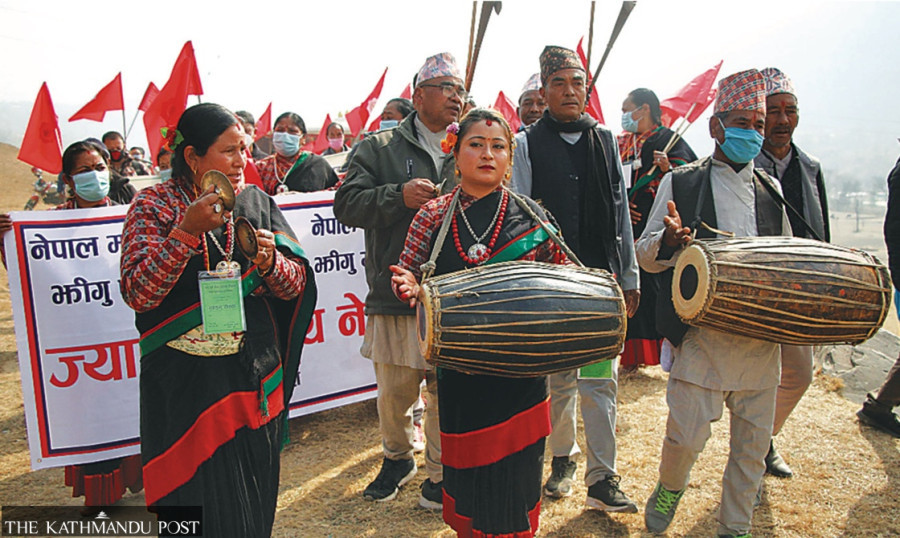Columns
Reassessing Indigenous knowledge
Framing Indigenous people as ‘resilient’ oversimplifies their ways of knowing and being.
Dhirendra Nalbo
On May 18, 2025, the Government of Nepal concluded its much-anticipated climate change conference by adopting a 25-point “Sagarmatha Call for Action.” Point 20 of the declaration addressed the role of indigenous people and their knowledge: “Recognise the role of local and Indigenous communities in climate policies, programs, and actions, including adaptation and conservation initiatives.” The government’s decision to merely “recognise” indigenous environmental knowledge fell short of global calls to integrate it into climate action. Yet, it is a welcome step for critical indigenous researchers like me.
Applying indigenous knowledge to mitigate climate change may seem promising. But this could be a flawed “quick fix.” Instead, we must ask: (a) What constitutes indigenous knowledge, and where does it reside? (b) How is it accessed, by whom, for whom and to advance whose interests?
In Nepal, as in parts of South and Southeast Asia, the term “indigenous knowledge” is contested, particularly by those who view it as a challenge to the status quo. Some Nepali intellectuals dismiss or distrust these knowledge systems. At a public discussion, a well-known intellectual rejected the very existence of Indigenous knowledge systems. Such skepticism and discomfort often arise from: (a) an objectivist, individualistic, and human-centric worldview; (b) a bias towards experiment-based, Eurocentric research that reinforces hegemonic practices; and (c) a problem-solving orientation in which the “educated” position themselves as moral agents tasked with “helping” marginalised communities, thereby reinforcing a hierarchical dynamic between superior knowers and passive recipients.
The three forms of social science research approach noted above are foundational to dominant academic research practised worldwide, including in policymaking. Recent years have seen significant and historic advancements in human knowledge and societal progress, yet they have also added fundamental challenges.
Globally, countries have made significant strides in health, wealth and technology. Despite progress, stark inequalities persist. The 10 richest individuals hold more wealth than 3.1 billion people, and over half of those in lower- and middle-income countries see inequality as a major concern. Climate change worsens these divides, hitting the poor hardest. The IPCC reports that people in poverty are up to 15 times more likely to die from climate-related disasters than those with the means to cope.
These two contrasting realities currently confronting human civilisation have brought indigenous knowledge systems—long dismissed and ignored by governments globally—back into the spotlight as a hopeful means to confront present and future climate crises. In many ways, the (re)emergence of indigenous knowledge systems is linked with the critique of the capitalist development model: A model that is self-sabotaging, “failing forward” and designed to fail, leading to human-induced climate change or the Anthropocene. Some scholars have even gone one step further, calling not just for the inclusion of Indigenous knowledge, but for actually becoming Indigenous—living, thinking and knowing like Indigenous people—to respond to the climate crisis.
The challenges noted above signal a key point: The current development model is in urgent need of restructuring and reform, for which Indigenous knowledge systems provide vital perspectives and tools for shaping alternative, more sustainable forms of development. This point indicates a desire to continue the business as usual with readjustment and reform to the current development practice, perhaps by combining “human and technological ingenuity” and Indigenous knowledge systems. In that sense, such knowledge becomes part of a technical fix, seeking a mere “reform” rather than fundamental change or “revolution.” No wonder countless organisations frame indigenous communities as “resilient.”
Definitions of resilience can offer insight, but they also raise questions. Merriam-Webster defines it as “capable of withstanding shock without permanent deformation or rupture and tending to recover from or adjust easily to misfortune or change.” The Cambridge Dictionary describes it as “able to be happy, successful… after something difficult or bad has happened,""able to improve quickly after being hurt or being ill,” or “able to return quickly to a previous good condition after problems.” Placed in the context of Indigenous communities, these definitions feel overly romanticised. Are Indigenous people always “happy,” “successful,” and unbreakable? More importantly, do they see themselves as “resilient”?
Indigenous communities’ continuous survival against systemic violence, including genocide, persecution, sexual abuse, exclusion and displacement from their ancestral territories, is often described as “resilience.” But such “resilience” comes at the cost of a significant psychological toll: Intergenerational trauma characterised by self-loathing, guilt, emotional withdrawal and numbness. If we are to invoke “resilience” in policy discourse, we must also ask: How can such trauma be acknowledged and integrated into meaningful, culturally grounded interventions? The term “resilience” may be used with sincere respect, but it obscures and oversimplifies indigenous communities’ ways of knowing and being.
Historian Pekka Hämäläinen frames Native American survival against the colonial settlers in what later became the United States not as mere “resilience,” but as the outcome of decentralised, kinship-based, egalitarian governance. This legacy endures today through the 574 federally recognised tribal governments across the US. While these tribal governments testify to Indigenous persistence and self-determination, a key question remains: How have states and institutions incorporated Indigenous governance models into their development frameworks? Equally important is understanding how tribal governments globally navigate their historical identities and future aspirations amid the climate crisis.
These questions are at the heart of two differing worldviews, which are framed under Indigenous and Western Eurocentric approaches; both of which shaped the past, help inform the present and imagine the future for humans and non-humans alike, including how knowledge is inquired and produced in an era of Anthropocene. The former approach considers humans intertwined with Nature, where trees are living entities with spirits that guide us, and the land is a repository of stories, ancestry, and belonging. In contrast, the Western capitalist approach considers humans as separate from and dominant over Nature, in which land is an “estate” to be owned, controlled and commodified, while trees are resources to be extracted, commercialised and used.
To present these two complex worldviews in an irreconciled way is unhelpful. Such a way of conceiving them hinders a constructive way of reflecting on the past, understanding the present and envisioning the future together. More constructive questions should be asked: What does it mean to experience a shift from seeing Indigenous communities as “victims” to recognising them as sources of different types of knowing and being? More practically, how can we make sense of place-based knowledge? What might research look like when it moves beyond a human-centric approach? And what are the limits of current technocratic and problem-solving development models? Theories do not force action; they require careful study and open debate.
Thus far, the Government of Nepal has avoided oversimplifying Indigenous knowledge systems by labelling communities as merely “resilient” in the Sagarmatha Sambad. This restraint—likely unintentional—has helped prevent the perpetuation of misconceptions of the foundational principles of Indigenous knowledge systems. Perhaps it is time to critically examine what we truly mean by Indigenous knowledge systems and their implications for addressing the Anthropocene, including how we organise and govern our politics, economy and society.




 9.7°C Kathmandu
9.7°C Kathmandu















